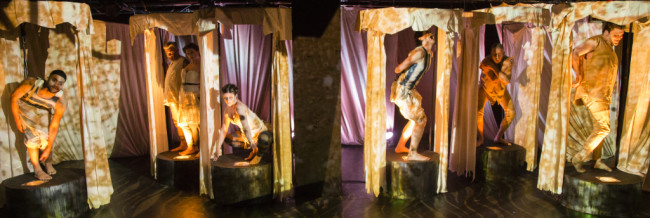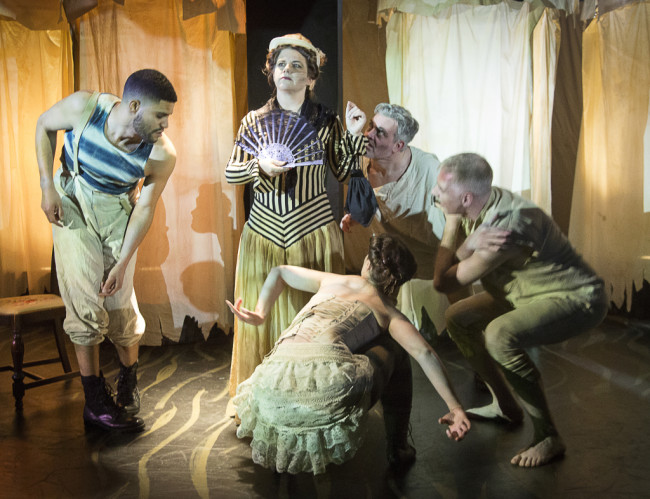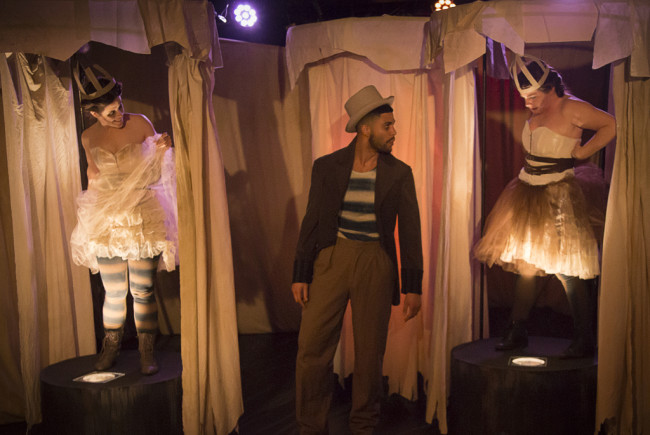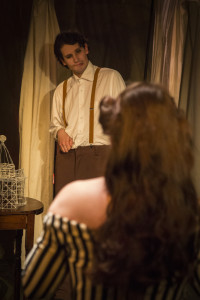Artists make illusions of illusions of heaven and the artists dreaming with the voices loud as thunder in the minds at the Maryland Ensemble Theatre have fabricated an illustriously dark and decadently dark distortion of heaven in their current production of Bernard Pomerance’s The Elephant Man. Directed by visionary and company member Julie Herber, this nightmarish dreamscape of fascination entreats the senses, tugs at the heartstrings and ensnares the soul in a fashion most mesmeric. Truly not of this existential plane but crafted carefully in a world that resembles our own, this production of The Elephant Man is thought-provoking and begs the question of acceptance among those of us that believe ourselves to be normal.
Nurtured to first see with the eye and then hear with the ear it is an exceedingly curious and exciting phenomenon that Sound Designer Steve Younkins crafts a soundscape that is immediately noticeable. The haunting tinkle of a music box which has stirred itself to life from the derelict recesses of the warped imagination loses the audience in the world of enigmatic spectacle and ghastly horror right from the beginning. Reminiscent of a circus but only suggestively so, Younkins’ placement of this sort of melancholy but enigmatically nostalgic soundtrack sparks mystery and intrigue among the audience. Furthering this notion of distorted and fragmented dreams, Younkins fills the scene transitions with strange pulses of music that underscore the even stranger choreography of the ensemble in these moments.

Conceiving the notion of a circus without smacking of the obvious or following down the path of overkill is the job of Set Designer Joann Lee, one which she accomplishes with remarkable accuracy. It is the simple ring-curtained stalls that create the skeleton of this illusion, allowing for the audiences’ imaginations to connect the dots in their minds. Lee’s work, in addition to that of Lighting Paul Schillinger and Property Designer Devin Gaither, formulates structure among Director Julie Herber’s fantastical notions of dark fantasy and twisted reality. Schillinger uses ghostly phantoms of light to accentuate the grotesque movements of the ensemble corps as they shift about between scenes, and his under-lighting of their figures in the circus-ring-tent-stalls casts ghastly shadows to draw their faces as gaunt Ghoulies for a heightened sense of fear-mongering. Gaither’s work is most keenly appreciated in her three-dimensional printing of Merrick’s models, things of beauty allowed to radiate briefly in an otherwise ugly world.
Director Julie Herber brings strong vibes of interpretive movement into this performance, a well curved signature of a great many of her pieces. This bodes exceptionally well as a vessel for thematic interpretation throughout the production until the show’s end wherein Herber lays a superfluous meandering of bodies. This post-plot symbolic dance is a stretch to reinforce the notion that we all cope with our own deformities and see our own versions of how we view the world and how we are viewed in it. Because the performance is well done with stellar actors that master their sense of character and purpose throughout the play, this ultra-coda feels excessive when less could have simply been more.

Herber does however master the pacing of the show, using these warped dance routines throughout the scene transitions to disorient the audience just enough to keep them thinking. This technique of blurring dreaming with waking and fantasy with reality is what gives the show its edgy verve. Herber, working with Dialect Coach Eric Jones, creates realistic believable characters— even if they are whims of fantasy— in the reality of the show, grounding their performances in their core emotions and beliefs. The result is an earnest and heartfelt, albeit surreal, drama that speaks in a language long forgotten to human ears, the language of the compassionate human soul.
True to the company’s namesake, the ensemble of this cast moves fluidly as one throughout the performance. Gliding through the nightmarish dreams and dreamy nightmares between the scenes or responding presently in the active scenes, no one person feels out of place in this production. A scene at the top of the second act, comprised mostly of miniscule narrative asides where the ensemble pop in and out of their circus ring curtains, showcases how the responsibility of the story is shared among the cast. In these “like me” mini monologues the cast executes flawless timing snapping between each moment, allowing it to be breathed into existence, resonate for a second, and vanish into the ether before surging onto the next moment.

Appearing first as the crass cockney Ross, James McGarvey sets the audience to despise him early on. Appearing later as Bishop How, McGarvey works in a different and redeeming light. As Ross, the heavy gravel which spots his thick accent gives the character the appropriate abrasive edges for abusing his the character that he sees only as a freak-show profit. A thorough ‘baddun’ as it may be said on the foggy streets of the time, McGarvey’s inherent malignancy toward Merrick is galling. Particularly when he reappears later in the second act, the audience once again finds it easy to loathe him and everything he attempts.
Pinheads (Vanessa Strickland and Genè Fouchè) featured in congruency with the nature of the “freak-show” are two cowering individuals trapped and lost in their own internal struggle. Both Fouchè and Strickland, who play several roles throughout the performance, adapt a unique physicality for their portrayal of ‘The Pinheads’ bending and folding over themselves which reflects their internal struggle of existing as nothing more than a spectacle for the greedy paying public. Fouchè also tackles the role of Mrs. Kendal, the sweet, albeit cautious, woman with whom a friendship formulates between herself and the title character. A great deal of Fouchè’s performance is experienced through her attentive listening and reactionary responses to her interactions with Merrick. A demure gesture or gentle phrase finds itself occurring with honesty when she speaks with him or is featured alone with him on stage.

A true gentleman of the times Frederick Treves (Jack Evans) is a man of earnest sympathies and empathies, doing his best to guide the title character through a world of safety with the best of intentions. Evans’ accent is crisp and clearly articulated, placing the show in the late 1880’s and in London Town proper. Always upright with a ramrod posture, a sharp contrast when juxtaposed to the crippling physique of John Merrick (Matthew Lee) Evans carries himself with the airs of money and good fortune but without the haughty arrogance so often associated with members of that class. Despite his clinical and scientific nature and assessment upon initially encountering Merrick, the revolt and disgust resonates through his voice with palpable intent. Not without his own moments of dynamic frustration, Evans finds a way to delve into the character’s psyche without internalizing it. His outburst after a particular moment featuring Merrick and Mrs. Kendal defines the rawness of his internal emotions.

Suspending your disbelief has never been more of a theatrical delight than with Matthew Lee’s performance as John Merrick, The Elephant Man. So thorough is his emotional anguish and torment, so fleshed out is the tortured agony of his character’s soul that it reads intensely through his voice, spreading onto his features and through his physicality. While there is no physical disfigurement, save for the impressive and committed limp and twist of facial features, Lee’s performance is so striking and delivered with such fully articulated intention that one can see his disfiguration appearing on his person as if his acting ability were serving as the special effects makeup. A stunning performance with broken speech that is both harrowing and pristinely intelligible, Lee expresses a myriad of emotions in this richly dynamic character. The magnitude of the character is portrayed with such excellence that Lee’s journey with John Merrick pierces the soul.
A curiosity worth investigating, The Elephant Man will turn your thoughts inside out and your world upside down as you try to find your footing among the dreams and the nightmares, amid the circus and the charade that is life. For after all, as we push ourselves to be normal, are we not but drawing ourselves one step closer to death?
Running Time: 2 hours and 5 minutes with one intermission
The Elephant Man plays through May 3, 2015 at the Maryland Ensemble Theatre located at 31 W. Patrick Street in historic Frederick, MD. For tickets call the box office at (301) 694-4744 or purchase them online.


